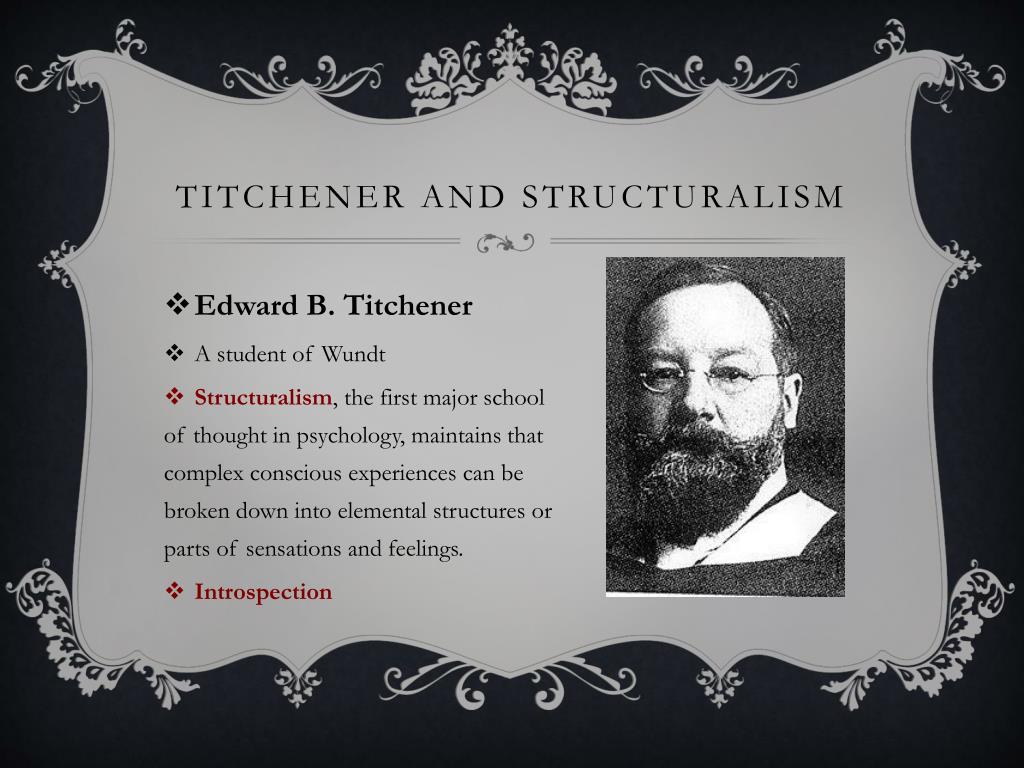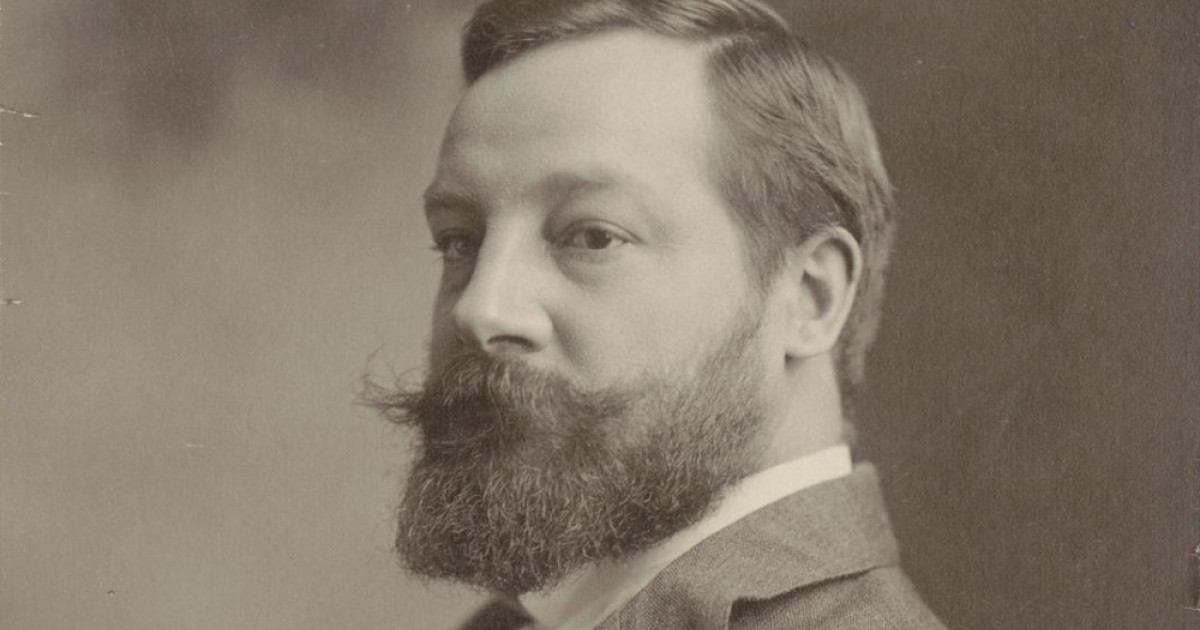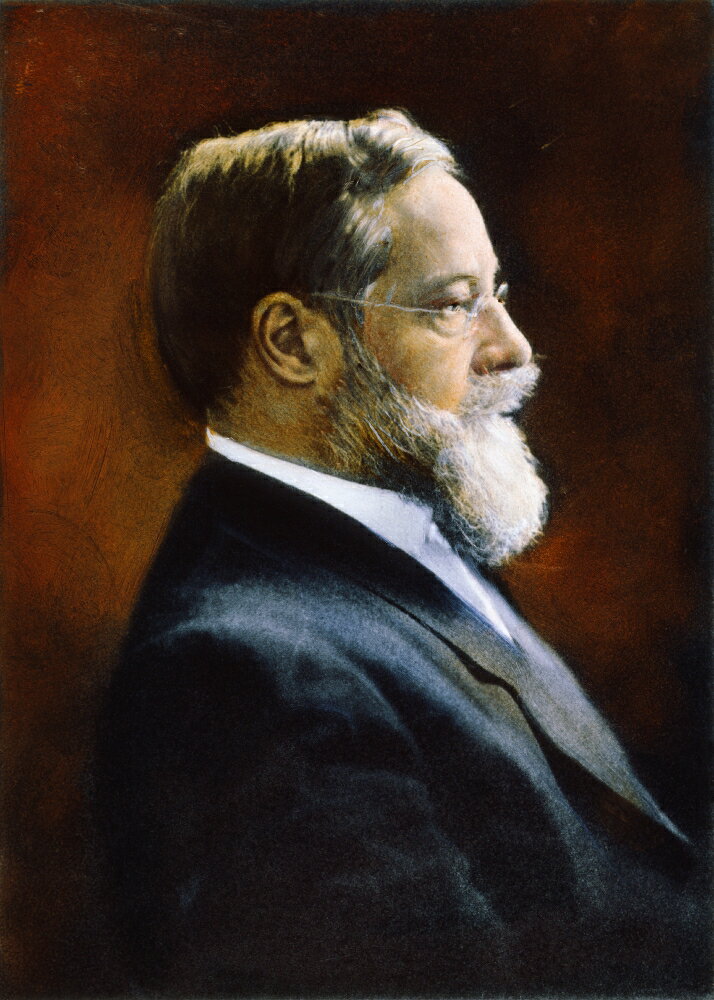Posterazzi Edward B Titchener N(18671927) American Psychologist Oil

Structuralism in Psychology Definition & Examples (2023)
Edward B. Titchener (1867-1927) was a prominent figure in the field of psychology, best known for his role in developing structuralism, a school of thought that aimed to understand the basic elements of human consciousness.Born in Chichester, England, Titchener's intellectual pursuits led him to become a key figure in the early days of experimental psychology in the United States.

What is Structuralism? Who is Edward Titchener ?Introspection, Law of
Edward Bradford Titchener, a student of Wilhelm Wundt, is often given credit for introducing the structuralist school of thought. While Wundt is sometimes identified as the founder of structuralism, Titchener theories differed in important ways from Wundt's. While he was a dominant force in psychology during his lifetime, the school of thought.
:max_bytes(150000):strip_icc()/edward-bradford-titchener-96815883-571fd28f3df78c5640a3d4ea.jpg)
Biography of Psychologist Edward B. Titchener
Edward B. Titchener (born January 11, 1867, Chichester, Sussex, England—died August 3, 1927, Ithaca, New York, U.S.) English-born psychologist and a major figure in the establishment of experimental psychology in the United States. A disciple of the German psychologist Wilhelm Wundt, the founder of experimental psychology, Titchener gave.

PPT THE HISTORY OF PSYCHOLOGY PowerPoint Presentation, free download
Structuralism, in psychology, a systematic movement founded in Germany by Wilhelm Wundt and mainly identified with Edward B. Titchener. Structuralism sought to analyze the adult mind in terms of the simplest definable components and then to find the way in which these components fit together in complex forms.

Edward Tichener the father of structuralism. History of psychology
The systematic movement of structuralism in psychology had started in Germany and was introduced by Wilhelm Wundt and popularized by Edward B. Titchener. Wundt, regarded as the 'Father of.

CHAPTER 1 1 STRUCTURALISM Edward B Titchener established
Titchener was born in Chichester, England, on January 11, 1867 to John and Alice (nee Habin) Titchener. His ancestors had lived in Chichester since the 1500s and many had been wealthy and influential (see Boring 1927 for more detail). But Titchener s paternal grandfather lost the family. fortune and died poor.

Edward Titchener, British psychologist Stock Image C038/2492
One of Wundt's students, Edward B. Titchener,. While neither of these early schools of thought remains in use today, both influenced the development of modern psychology. Structuralism played a role in the drive to make psychology a more experimental science, while functionalism laid the groundwork for the development of behaviorism..

Structuralism in Psychology (Structuralism in Psychology Defined
The first stage is exemplified in Titchener's An Outline of Psychology, in its three editions of 1896, 1897, and 1899 (Titchener 1896; 1897; 1899a) and in his A Primer of Psychology, first published in 1898 and revised in 1899 (Titchener 1898; 1899b).These early books, particularly the Outline, form the first draft of Titchener's structural psychology and remained the core of that.

Edward Titchener y la psicología estructuralista
Edward B. Titchener: The Complete Iconophile. An Englishman, Edward B. Titchener, became one of Wundt's most influential students. After graduate studies with Wundt, Titchener moved to the United States and became Professor of Psychology at Cornell, where, as well as being responsible for translating many of the more experimentally oriented works of Wundt into English, he established a.

Neurotree Edward Bradford Titchener
Wilhelm Wundt and Edward Titchener. STRUCTURALISM: Wilhelm Wundt and Edward Titchener. Wilhelm Wundt (1832-1920): •Established first Psychology Lab in Germany. •Defined psychology as the science of human mind and consciousness. •Used the method of objective introspection to identify the basic mental elements. Edward Titchener (1867-1927):

Structuralism, Wilhelm Wundt, & Edward Titchener Psychology YouTube
Structuralism in psychology refers to the theory founded by Edward B. Titchener (1867-1923), with the goal to describe the structure of the mind in terms of the most primitive elements of mental experience. This theory focused on three things: the individual elements of consciousness, how they organized into more complex experiences, and how.

PPT Structuralism in Psychology PowerPoint Presentation ID2734199
What was the structuralism approach to psychology? Who was Wilhelm (William) Wundt, Edward B. Titchener, and Margaret Floy Washburn? Watch this video to find.

Posterazzi Edward B Titchener N(18671927) American Psychologist Oil
It was his student, Edward B. Titchener, who invented the term structuralism . Though Titchener is usually the one credited with the establishment of structuralism and bringing the ideas to America, the ideas started with Wundt. Titchener actually changed much of what Wundt taught. Wundt believed that similar to other sciences, the mind could.

Edward B Titchener On Psychology as the Behaviorist Views It
Structuralism in psychology (also structural psychology) [1] is a theory of consciousness developed by Edward Bradford Titchener. This theory was challenged in the 20th century. Structuralists seek to analyze the adult mind (the total sum of experience from birth to the present) in terms of the simplest definable components of experience and.

Edward Titchener's Structuralism
In 1879, Wilheim Wundt set this laboratory up at the University of Leipzig. He also published what is now regarded as the first psychology textbook. He and a student, Edward Bradford Titchener, set out to study psychology and to better understand consciousness. They developed structuralism, arguably the first "school" of psychology.

Structuralism Edward Titchener & the Stimulus Error YouTube
Edward Bradford Titchener (11 January 1867 - 3 August 1927) was an English psychologist who studied under Wilhelm Wundt for several years. Titchener is best known for creating his version of psychology that described the structure of the mind: structuralism. After becoming a professor at Cornell University, he created the largest doctoral.